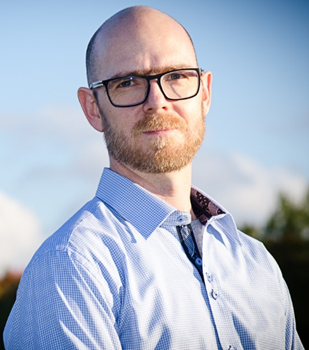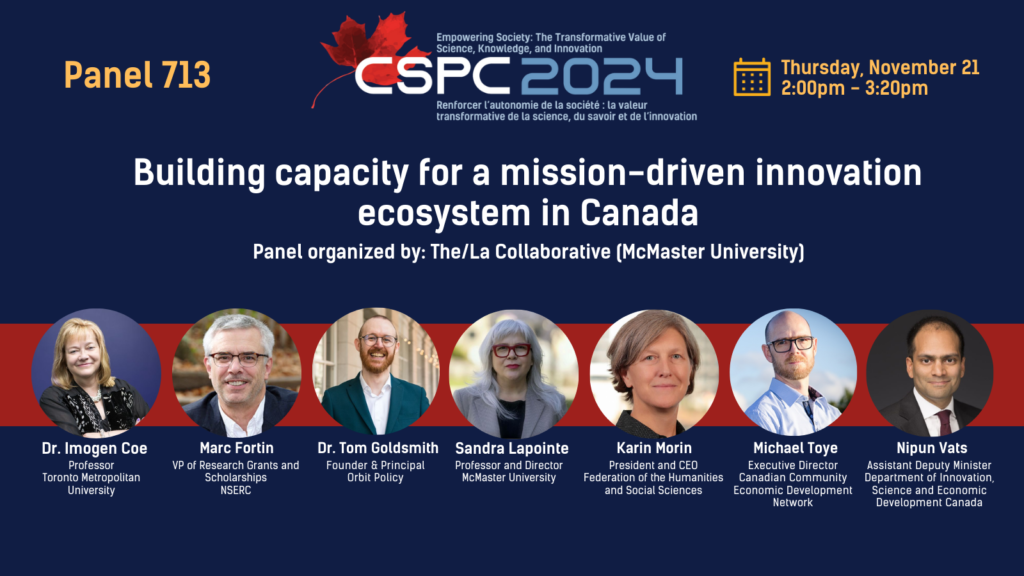To address emergent societal challenges and generate societal prosperity, mission-based innovation needs to be grounded in apt approaches to complexity and knowledge management. This involves a dedicated effort to create alignment in policy across levels to optimize overall impact, enhanced programming for inclusive, innovation-focused skills-training of highly qualified personnel and support for place-based relational and material infrastructure that allow innovation flow within each zones of impact and across the innovation ecosystem.

Tom Goldsmith, Founder and Principal at Orbit Policy Consulting
Why are we talking about missions? We need to acknowledge two things: First, our current research and innovation model hasn’t yielded wide-felt societal and economic benefits to Canada. This isn’t a problem of the quality of our scientific research but speaks to a wider systemic failure to commercialize and deploy research insights outside of academia. The second is that we are facing complex and interlinked societal challenges of scales not seen before. It is increasingly acknowledged that hands-off, market-oriented policy approaches are no longer sufficient to tackle these problems. This includes research and innovation, where trusting the market to surface and deploy ideas to tackle these problems with the urgency required isn’t feasible. We need greater directionality and mission-oriented approaches are an emerging part of the tool kit that could help provide that.
Marc Fortin, Vice-President Research at the Natural Sciences and Engineering Research Council
Mission-based innovation is the latest concept around innovation. Consensus about what we mean by this, what we want to achieve, and how we will achieve this will be key to convincing stakeholders and decision-makers of the importance of their support. This implies changes in the way we work with each other and with stakeholders and as well as in how this work is funded.


Imogen Coe, Founding Dean of the Faculty of Science at TMU
Canada is an increasingly diverse society across multiple demographics and yet traditional aspects of innovation (however defined) have often excluded communities where innovative policies could have the greatest impact (health, housing, etc.) and yield significant and widely felt social and economic benefits. How can we ensure that innovation is defined, delivered and evaluated in a way that clearly has equity and inclusion built in, as both an ethical imperative and, perhaps more importantly, as a clearly recognized and accepted driver of excellence and increased impact.
Karine Morin, CEO of the Federation for the Humanities and Social Sciences
Innovation is a human centered activity and policy needs to place greater emphasis on its social benefits. If we intend to achieve success in tackling pressing social needs, it will become necessary for the research and innovation endeavor to rethink the significance of the perspective that comes from the social sciences and humanities


Nipun Vats, Assistant Deputy Minister Science and Research Sector, Innovation, Science & Economic Development Canada
While investigator-led research is the foundation of our research enterprise, it can be challenging for governments and citizens to reap the full benefits of research knowledge. In Budget 2024, the Government of Canada announced a number of actions to modernize the federal research support system, including the creation of a new capstone organization that aims to enhance coordination across disciplines and harness Canadian research to better address emerging challenges.
Mike Toye, Chair of the Social Innovation Advisory Council at Employment & Social Development Canada
Mission based innovation has to start and end in communities. Social innovation shouldn’t be an expert domain – it’s practitioners and community members who must be at the table. Communities are best placed to identify priority missions, and are essential partners in the co-design of interventions. Because often the innovations are already out there; but they require adaptation and scaling. Social innovations require different mechanisms for scaling. It’s also at the community level where many silos come together. The issues missions seek to address are complex. We’ve structured responses by jurisdiction, orders of government and departments, agencies and institutions, but those all come together in the experience of individuals in a community. The connecting, knowledge transfer role must draw upon the relevant elements of many innovation ecosystems.


Host and Moderator: Sandra Lapointe, Professor and Director of The/La Collaborative at McMaster University

